【外研版】高中英语必修四:Module4Greatscientists语法学案含答案
外研版高中英语必修四Module 4 Great Scientists 重难点知识点总结
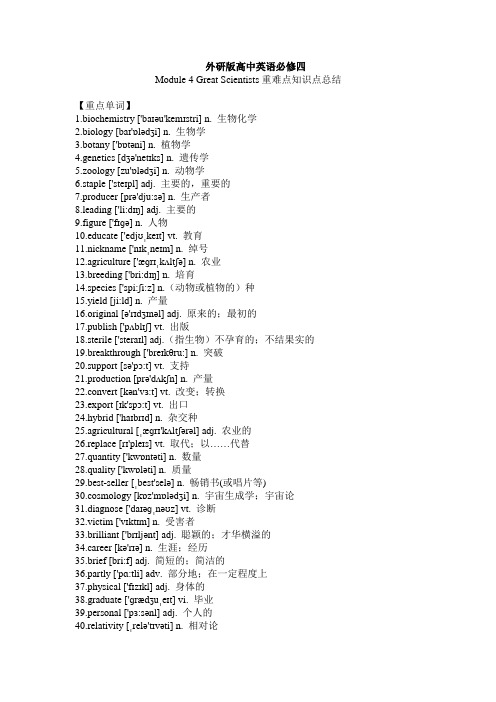
外研版高中英语必修四Module 4 Great Scientists 重难点知识点总结【重点单词】1.biochemistry ['baɪəu'kemɪstri] n. 生物化学2.biology [baɪ'ɒlədʒi] n. 生物学3.botany ['bɒtəni] n. 植物学4.genetics [dʒə'netɪks] n. 遗传学5.zoology [zu'ɒlədʒi] n. 动物学6.staple ['steɪpl] adj. 主要的,重要的7.producer [prə'dju:sə] n. 生产者8.leading ['li:dɪŋ] adj. 主要的9.figure ['fɪɡə] n. 人物cate ['edjʊˌkeɪt] vt. 教育11.nickname ['nɪkˌneɪm] n. 绰号12.agriculture ['æɡrɪˌkʌltʃə] n. 农业13.breeding ['bri:dɪŋ] n. 培育14.species ['spi:ʃi:z] n.(动物或植物的)种15.yield [ji:ld] n. 产量16.original [ə'rɪdʒɪnəl] adj. 原来的;最初的17.publish ['pʌblɪʃ] vt. 出版18.sterile ['steraɪl] adj.(指生物)不孕育的;不结果实的19.breakthrough ['breɪkθru:] n. 突破20.support [sə'pɔ:t] vt. 支持21.production [prə'dʌkʃn] n. 产量22.convert [kən'vɜ:t] vt. 改变;转换23.export [ɪk'spɔ:t] vt. 出口24.hybrid ['haɪbrɪd] n. 杂交种25.agricultural [ˌæɡrɪ'kʌltʃərəl] adj. 农业的26.replace [rɪ'pleɪs] vt. 取代;以……代替27.quantity ['kwɒntəti] n. 数量28.quality ['kwɒləti] n. 质量29.best-seller [ˌbest'selə] n. 畅销书(或唱片等)30.cosmology [kɒz'mɒlədʒi] n. 宇宙生成学;宇宙论31.diagnose ['daɪəɡˌnəʊz] vt. 诊断32.victim ['vɪktɪm] n. 受害者33.brilliant ['brɪljənt] adj. 聪颖的;才华横溢的34.career [kə'rɪə] n. 生涯;经历35.brief [bri:f] adj. 简短的;简洁的36.partly ['pɑ:tli] adv. 部分地;在一定程度上37.physical ['fɪzɪkl] adj. 身体的38.graduate ['ɡrædʒuˌeɪt] vi. 毕业39.personal ['pɜ:sənl] adj. 个人的40.relativity [ˌrelə'tɪvəti] n. 相对论41.rocket ['rɒkɪt] n. 火箭lennium [mɪ'leniəm] n. 千年43.gunpowder [ɡʌnˌpaʊdə] n. 火药44.explosion [ɪk'spləʊʒn] n. 爆炸;爆炸声45.explode [ɪk'spləʊd] vi. 爆炸46.escape [ɪ'skeɪp] vi. 逃跑;逃避47.arrow ['ærəʊ] n.(弓)箭48.straight [streɪt] adj. 直的49.clear [klɪə] vi.(烟雾)消散【重点短语】1.experiment with sth. 用某物实验2.experiment on sth. 对某物进行实验3.carry out/perform/conduct an experiment 做实验4.make a breakthrough 取得重大突破(进展)5.convert A into/to B 把A转换成B6.take the place of 取代,代替7.instead of 代替,而不是8.bring up 抚育;教养;呕吐;提出(话题等)9.bring down 降低10.bring about 导致,引起11.bring back 归还;恢复;回想12.bring in 赚(钱);带进;传入13.search for 寻找14.search sb./someplace 搜查某人或某地15.in search of 寻求/寻找……16.as a result of 由于……的结果17.as a result 因此,结果18.owing to/thanks to 由于19.the key to… ……的关键20.export sth. to 出口某物到……21.the second most important 第二重要的22.be interested in… 对……感兴趣23.graduate from… 从……(地方)毕业24.escape from /out of someplace 从某地逃脱/逃走25.escape from reality 逃避现实26.have a narrow escape 九死一生27.a fire escape 紧急出口;安全门28.clear up (天气)放晴;整理;收拾29.be known for 因……而出名/闻名30.earn one’s living 谋生e to power 掌权;执政32.take power 取得政权33.It is possible that…. 可能……34.It’s certain that... 肯定……35.It’s likely that… 可能……36.It seems that... 好像……37.at war 在交战中38.be diagnosed with 被诊断出;患有39.become the voice of... 成为……的代言人40.partly because of 部分原因是【重点句型】1.She needs a high income to support such a large family.她需要一份高收入来养活这么一大家子。
外研版英语必修四 Module 4 Great Scientists 知识点课件28张
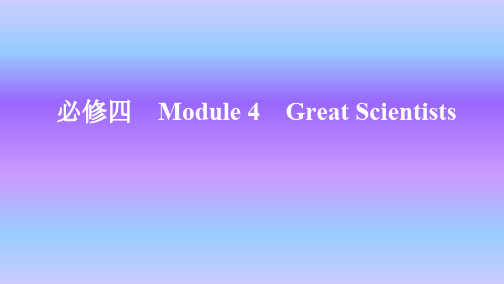
③Bob looked back only to find an old classmate whose name escaped (escape)him for the moment. ④The people in the Kiss Nightclub were trying to escape from the fire but were trapped by smoke. ⑤While he was crossing the street, he narrowly escaped being knocked (knock) down. ⑥The murderer ran away, trying to escape being caught (catch) by the police, but in vain.
3. escape v.逃跑;溜走;逃避;(指气体、液体等)漏出,被忘掉 n.逃跑 教材原句 ①The Chinese discovered that the gas escaping (escape) from the tube could lift it into the air. ◆单句填空 ②Fortunately, Natalie’s family escaped (escape) to Brooklyn shortly before the city’s bridges closed.
【点津】escape用作及物动词时,表示逃避或躲避不愉快的事(监禁、管
制、处罚等不幸或灾难),用作不及物动词时,则是指从监禁、管制或受
点拨 (1)support oneself 自力更生,自谋生机 support one’s family 养家糊口 support one’s opinion 支持某人的观点 (2)win/lose one’s support赢得/失去某人的支持 with sb.’s support有某人的资助 in support of支持
外研版高中英语必修四备课Module 4 Great Scientists词汇详解 教学素材
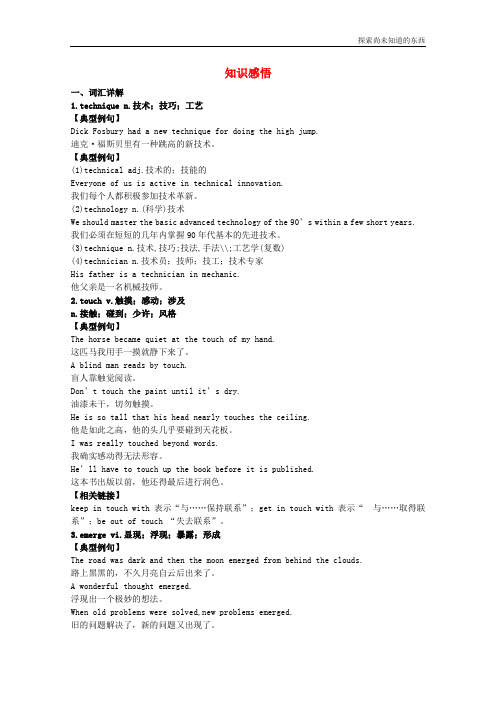
知识感悟一、词汇详解1.technique n.技术;技巧;工艺【典型例句】Dick Fosbury had a new technique for doing the high jump.迪克·福斯贝里有一种跳高的新技术。
【典型例句】(1)technical adj.技术的;技能的Everyone of us is active in technical innovation.我们每个人都积极参加技术革新。
(2)technology n.(科学)技术We shoul d master the basic advanced technology of the 90’s within a few short years.我们必须在短短的几年内掌握90年代基本的先进技术。
(3)technique n.技术,技巧;技法,手法\\;工艺学(复数)(4)technician n.技术员;技师;技工;技术专家His father is a technician in mechanic.他父亲是一名机械技师。
2.touch v.触摸;感动;涉及n.接触;碰到;少许;风格【典型例句】The horse became quiet at the touch of my hand.这匹马我用手一摸就静下来了。
A blind man reads by touch.盲人靠触觉阅读。
Don’t touch the paint until it’s dry.油漆未干,切勿触摸。
He is so tall that his head nearly touches the ceiling.他是如此之高,他的头几乎要碰到天花板。
I was really touched beyond words.我确实感动得无法形容。
He’ll have to touch up the book before it is published.这本书出版以前,他还得最后进行润色。
高中英语外研版复习课件:必修4 Module4 Great Scientists
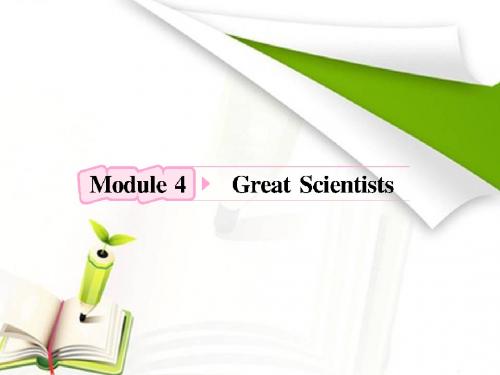
19.graduate vi.毕业 →graduation n.毕业 →graduate n.毕业生 20.explode vi.爆炸 →explosion n.爆炸,爆 炸声
1.leading adj.主要的,领先的 归纳拓展 (1)play a leading role/part in sth.在某事中起主导作用 (2)lead v.领导,带领 lead to通向,通往,导致
(2)a quantity of后面跟可数名词复数,谓语动词用复数;
后面跟不可数名词,谓语动词用单数。 large quantitour work has improved in quantity and quality this term. 本学期你的作业在数量和质量上都有提高。 It’s a lot cheaper if you buy it in quantity. 如果你大批量购买要便宜得多。
【解析】
例句:We support the police whole-heartedly in their work against crime.我们全力支持警方打击犯罪活动。 She needs a high income to support such a large family. 她需要一份高收入来养活这么一大家子。 Thank you for all your support at this difficult time.谢谢
【解析】
考查动词短语辨析。 lie in“ 在于 ” ; result
from“ 起因于 „„” ,后面跟原因; lead to“ 导致;通往 ”; begin with“首先,起初”。句意为:一个人需要努力工作来 实现他 / 她的梦想,正如谚语所说的那样 “ 努力工作通往成 功”。根据题意,选C。 【答案】 C
外研版高中英语必修4《odule 4 Great Scientists Grammar》优质课课件_9
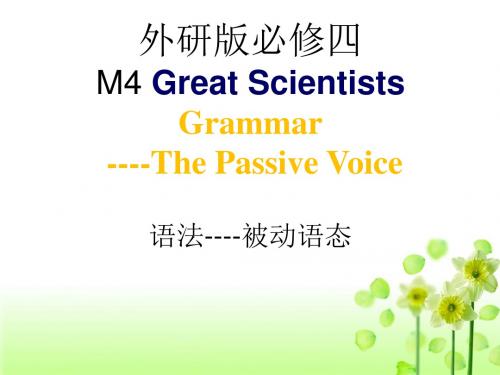
Point two:各种时态的被动
一般现在时
现在完成时
一般过去时
过去完成时
一般将来时
现在进行时
ቤተ መጻሕፍቲ ባይዱ过去将来时
将来完成时
Point three: 何时使用被动语态
1.没有必要、不清楚谁是动作的执行者, 或不想指出动作的执行者时; 2.强调或突出动作的承受者时。
Point four:主动表被动总结
1.值得做 be worth+doing 2.需要做 need(want / require)+ doing 3. “----起来” write/wash/sell/burn/dry/read(写洗卖烧干 读)+well/easily 4.句型:主语+be+adj.+to do, 5.系动词+形容词。look, smell, taste, sound, feel摸起来, prove, turn out等
3.这本书很畅销。
The book sells well.
4.英语不难学。
English is not difficult to learn.
5.这花闻起来很香。
The flower smells wonderful.
Point four:主动表被动总结
1.值得做 be worth+doing 2.需要做 need(want / require)+ doing 3. “----起来” write/wash/sell/burn/dry/read(写洗卖烧干 读)+well/easily 4.句型:主语+be+adj.+to do, 形容词为hard, difficult, easy, fit, necessary, dangerous, comfortable, heavy等,动词不定 式常用主动结构表被动含义。
高一英语Module 4 Great Scientists外研社知识精讲
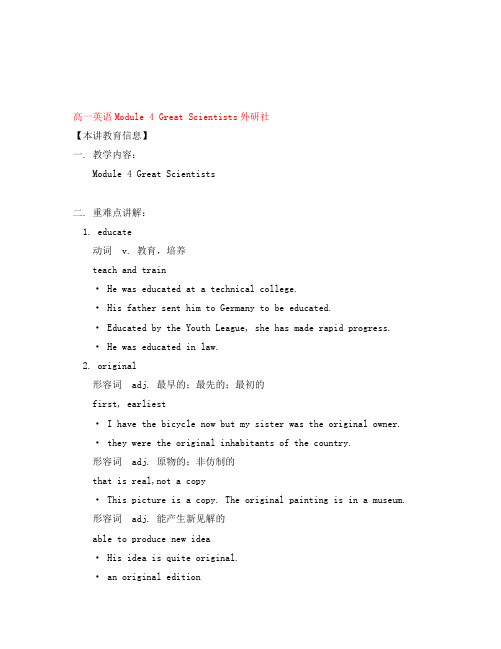
高一英语Module 4 Great Scientists外研社【本讲教育信息】一. 教学内容:Module 4 Great Scientists二. 重难点讲解:1. educate动词 v. 教育,培养teach and train· He was educated at a technical college.· His father sent him to Germany to be educated.· Educated by the Youth League, she has made rapid progress.· He was educated in law.2. original形容词 adj. 最早的;最先的;最初的first, earliest· I have the bicycle now but my sister was the original owner.· they were the original inhabitants of the country.形容词 adj. 原物的;非仿制的that is real,not a copy· This picture is a copy. The original painting is in a museum.形容词 adj. 能产生新见解的able to produce new idea· His idea is quite original.· an original edition名词 n. 原作;原版;原稿;原物thing of which there are copies· He can read Shakespeare in the original.· This is a good copy of the painting. The original is in the National Gallery.· The copy is every bit as good as the original.· after the original· read the book in the original· follow closely the original· mutilate the original· outshine the original3. support动词 v. 支持;支撑keep something or someone up; hold the weight of something· That small chair isn’t strong enough to support that heavy man.· This branch needs to be supported.· What is supporting the roof?· He was supporting himself with a stick.· Let me support you, take my arm.动词 v. 资助;维持help someone by giving money, etc.· Air, food and water are necessary to support life.动词 v. 供养;养活give food, clothes, and a home to someone· Mr. Donovan has to support a large family.· He has a wife and fifteen children to support.动词 v. 拥护;支持;帮助say that one thinks someone is best, right, etc. help· He decided not to support the new government.· He has always supported the weaker party.动词 v. 证明;证实serve to show (a statement, theory, etc.)to be true; give proof of; confirm· He told us facts which supported his argument.不可数名词 n.[U] 支持;拥护supporting someone or something; thing that gives support· We cheered to show support for our team.·He’s much stronger now; he can stand without support.· without support· give (some, any, not much, etc.)support (to)不可数名词 n.[U] 供养;生计means of maintenance· He’s the only support that his poor old mother has.· He does nothing for the support of his family.不可数名词 n.[U] 支持;后援;后盾backing influence· I hope to have your s upport.可数名词 n.[C] 支持者;支撑物;支柱;支座thing or person that supports· Put a support under it.· Take the supports away.4. convertv.转变,转换;使皈依宗教 n.改变信仰的人及物动词 vt. 改变,转换change; turn· Heat converts water into steam.· We converted defeat into victory.· This seat converts into a bed.· convert cotton into cloth· convert a bank note into gold· convert the sitting-room into a bedroom5. export动词 v. 输出,出口sell goods, etc. to another country· Many raw materials are exported to foreign countries.· Brazil exports coffee.可数名词 n.[C] 输出品,出口商品something that one country sells to another country· Both imports and exports continue to grow in volume.· Tea is an Indian export.不可数名词 n.[U] 出口,输出selling things to other countries· Spain grows oranges for export.· goods for export· allow the export of· prohibit(=stop) the export of· tax the exports6. replace及物动词 vt. 替换;取代;轮换put one thing in place of another thing· More new machines will be installed to replace the old ones.· Slowly each grain of wood was replaced with grains of minerals. · Lao Yang was elected to replace Lao Zhu in the committee.7. diagnose及物动词 vt. 诊断to discover the nature of (a disease)· The doctor diagnosed my illness as flu.8. escape动词 v. 逃跑,逃脱to get free from someone or something that is trying to hold one · The thief escaped by the backdoor.· The bird escaped from the cage.· They had no chance to escape.动词 v. 漏出,流出find a way out of a place· Water is escaping from the broken pipe.· The air is escaping somewhere.动词 v. 摆脱,躲避stay, keep, or get away from something that you do not like· He escaped being punished.· They escaped many difficulties.名词 n. 脱逃the act of escaping· There was no escape(from his enemies).· They had little hope of escape.名词 n. 漏(气、水)the escaping or flow of gas, water etc· There must be an escape of gas.三. 重难点词汇辨析:1. catch sb. doing sth; be (get) caught in sth.catch sb. doing sth.作“碰(遇)上某人正在做某事”解。
高一英语外研版-必修4-module-4-great-scientists-教案
Module4Great ScientistsT eaching Time:教学时间T eaching Aims:教学目标1.Knowledge and Skills知识与技能a.Make students know some words,phrase and related expressions about scientists.b.Make students mak e a revision about the passive voice and the usage of“by+-ing”.c.Mak e students learn to write an essay on great scientists’life.d.Make students proficiently master how to say the numbers.e.Improve students’abilities of listening,speaking,reading and writing.2.Process and Methods过程与方法a.Improve students’speaking ability thr ough group discussion.b.Improve students’analyzing and resolving abilities thr ough group cooperation.3.Emotion and Values情感与价值Make students know something about the current development of science and technology,as well as mak e them learn from those gr eat scientists,such as the spirit of devoting to science, seeking truth and persistent dedication for human’s happiness and development.T eaching importance and difficulties:教学重点与难点1.T eaching Importance教学重点a.Master some science-related vocabularies.b.Learn how to use passive voice.c.Learn how to say numbers.2.T eaching Difficulties教学难点a.Make students understand some common expressions used in quiz show while listening.b.Enable students to use passive voice correctly.c.Enable students to write essays on great scientists’life according to the structure of thepassage.T eaching Plan:教学计划P eriod One:Introduction,Reading and V ocabulary,FunctionP eriod Two:Grammar1and Grammar2P eriod Three:Listening and V ocabulary,Pronunciation,Everyday EnglishP eriod Four:Reading and WritingP eriod Five:Cultural Corner,Module FilePeriod One:Introduction,Reading and Vocabulary,FunctionT eaching Goals:1.T o know something about great scientists,such as Qian Xuesen,Marie Curie,Archimedes,Albert Einstein and Y uan Longping;2.T o learn some science-related words;3.T o learn how to say numbers.T eaching Procedures:Step1:Lead in-----IntroductionBrainstorm:Question:What great scientists do you know?(free speaking)Make students say something about those four great scientists---Qian Xuesen,Marie Curie, Archimedes,Albert Einstein.Name Nationality Major Invention/Discovery Time of thediscovery Qian Xuesen China Physics,Chinese atom bomb In1964MathematicsMarie Curie Archimedes P olandSicily in ItalyPhysicsPhysics,RadioactivitybuoyancyIn1898About240BC mathematicsAlbert Einstein Germany/Mathematical relativity In1905 America PhysicsMake students learn some words of different fields in science.Subjects Biochemistry Biology Botany Chemistry Genetics Physics Zoology Chinese meaning生化学生物学植物学化学遗传学物理学动物学The person who research the subjectsBiochemistBiologistBotanistChemistGeneticistPhysicistZoologistMake students finish exercise2on page31individually.The answers:1.zoology2.botany3.biology4.physics5.biochemistry6.chemistry7.genetics Step2:Reading and Vocabulary1.From the title“The Student Who Asked Questions”,guess what the passage is about?Who is the student?Question:What do you know about Y uan Longping?Name Nationality Major Invention/Discovery Time of thediscoveryY uan Longping China Agriculture Hybrid rice In19702.Make students find the topic sentence of each paragraph.Para1:Y uan Longping is a leading figure in the rice-growing world.Para2:As a boy,he was called“the student who asked questions”.Para3:As a y oung teacher,he began experiments in crop breeding.Para4:He discovered a special type of rice plant.P ara5:His discoveries increased Chinese rice production.P ara6:The yield of the new hybrid rice is much greater than that of other types gr own in Pakistan.3.Make students skim the passage and find the answers to the following questions.1)What kind of studen t was Y uan Longping when he was young?2)What way did he think to pr oduce rice more quickly?3)What did he discover?4)How important was the discovery?The possible answers:1)He was a stude nt with lots of questions and he was interested in plants.2)By crossing different species of rice plant,the n he could pr oduce a new plant which could give a higher yield th an either of the original plants.3)He discovered a naturally sterile male rice plant.4)Chinese rice production rose by47.5%in the1990’s.There were other advantages.●50,000square kilometers of rice fields were converted to growing vegetables and othercash crops.●Y uan’s rice was exported to other countries.●His rice’s yield is much greater than the yield of o ther types of rice gr own in Pakistan. 4.Make students read the passage carefully and decide whether the statement are true or false.1).China pr oduces more rice than any other country.2).Y uan Longping ask ed a lot of questions at school.3).He developed a new kind of fast-growing rice.4).The governmen t helped him in his research.5).The new rice replaced vegetables in50thousand square kilometers.6).The new rice is now gr own n other countries,such as Pakistan.The answers:TTTTFT5.Make students finish exercises in activity3and4on page33individually,then checkthe answers.Step3:Language points1.He thought that(the key to feeding people was to have more rice and to pr oduce itmore quickly.)宾语从句the key to sth./doing sth.---的关键to属于“介词”e.g.这就是考试失败的关键。
外研版必修四Module4GreatScientistsreading重点句型讲解课件
答案:1.up 2.As; of 3.to 4.for; of 5.to 6.after 7.in; with; of; for 8.By; of
3.The bank has offered a reward(奖赏) for any information ________(lead) the arrest of the men.
答案:leading to 句意:银行悬赏搜集信息,以便将那些 人绳之以法。lead to “导致,通向”。leading to the arrest of the men 作定语修饰information。
答案:1.originally 2.leading 3.converted 4.species 5.figures 6.published 7.support 8.breakthrough 9.exported 10.quality
Ⅱ.用适当的介词或副词填空 1. His parents died when he was a little child.He was brought ________ by his uncle. 2. ________ a result ________ his hard work,he got full marks in the English contest yesterday. 3. Practice has proved that economic growth is the key ______ solving the problem of poverty. 4. He continued his search ________ a better understanding ________ nature. 5. A chemical reaction is a process in which one species is converted ________ another.
外研版英语必修4 Module4 Great Scientists 教学说明
教学设计说明 本模块主题是〞大科学家〞。 INTRODUCTION Vocabulary and speaking 和 READING AND VOCABULARY 合并为第一课时〞阅 读课〞。课文〞The Student Who Asked Questions “ 讲 述的是中国当代科学家袁隆平。袁隆平,男,1930 年 9 月出生于,1953 年毕业于西南农学院农学系。毕业 后,一直从事农业教育与杂交水稻研究。 1980-1981 年赴美任国际水稻研究所技术指导。1982 年任全国杂 交水稻专家顾问组副组长。1991 年受聘联合国粮农组 织国际首席顾问。1995 年被选为中国工程院院士。1971 年至今任湖南农业科学院研究员,并任湖南省政协副 主席、全国政协常委、国家杂交水稻工程技术研究中 心主任。袁隆平院士是世界著名的杂交水稻专家,是 我国杂交水稻研究领域的开创者和带头人,为我国粮 食生产和农业科学的开展做出了杰出贡献。他的主要 成就表现在杂交水稻的研究、应用与推广方面。 课本 33 和 35 页为第二课时〞语法课〞,复习 the passive voice and by+-ing form。 课本 35 页是功能课〞Function〞 ,本模块学习使用 talking about numbers。 课本 37 页〞Reading and Writing〞为 “读写课〞,阅 读一篇关于 Stephen Hawking 的短文,写三段 Albert Einstein 的短文。 课本 39 页的 CULTURE CORNER 是〞文化阅读 课〞,〞Rockets 火箭〞。 火箭是一种现代化的空间运载工具。我国古代就对火 箭的根本原理有了一定的认识。烟花中的〞升天〞在 公元 10 世纪即在我国制成;北宋时期在抗击辽兵入侵 时,士兵曾用火药从箭尾燃烧喷射,以加大箭的射程, 火箭一词即由此而来。现代火箭的原理实质上就是动 量守恒定律。火箭内部装有燃料和氧化剂,它们经过 输送泵进入燃烧室,燃烧生成的大量炽热的高压气体 从喷嘴向后方连续喷射,喷射气体的反冲力就是火箭 的推动力。气体不断地喷出,火箭不断地受到向前的 推动力的作用,使速度不但曾大,最终达到很高的速 度。由于火箭自备氧化剂和燃料,因而不需要空气提 供推动力,所以可以在空气稀薄的高空或宇宙空间飞 行。 课本 40 页的 TASK 是〞任务课 〞,学习用英文 preparing a radio biography about a famous scientist。
【精选】_高中英语Module4GreatScientistsSectionⅡGrammar课件外研版必修4
三、听问题。
对于自己预习中不懂的内容,上课时要重点把握。在听讲中要特别注意老师和课本中是怎么解释的。如果老师在讲课中一带而过,并没有详细解答, 大家要及时地把它们记下来,下课再向老师请教。
She gave me a book. →A book was given to me by her.
She showed me a ticket. →A ticket was shown to me by her.
(5)一些动词短语用于被动语态时,动词短语应当看作一个整 体,而不能丢掉其中的介词或副词。
一、听要点。
一般来说,一节课的要点就是老师们在备课中准备的讲课大纲。许多老师在讲课正式开始之前会告诉大家,同学们对此要格外注意。例如在学习物理 课“力的三要素”这一节时,老师会先列出力的三要素——大小、方向、作用点。这就是一堂课的要点。把这三点认真听好了,这节课就基本掌握了。
二、听思路。
四、听方法。
在课堂上不仅要听老师讲课的结论而且要认真关注老师分析、解决问题的方法。比如上语文课学习汉字,一般都是遵循着“形”、“音”、“义”的 研究方向;分析小说,一般都是从人物、环境、情节三个要素入手;写记叙文,则要从时间、地点、人物和事情发生的起因、经过、结果六个方面进行 叙述。这些都是语文学习中的一些具体方法。其他的科目也有适用的学习方法,如解数学题时,会用到反正法;换元法;待定系数法;配方法;消元法; 因式分解法等,掌握各个科目的方法是大家应该学习的核心所在。
The flower ______s_m_e_l_ls_____________ wonderful. 5.孩子们得到很好的照料。
- 1、下载文档前请自行甄别文档内容的完整性,平台不提供额外的编辑、内容补充、找答案等附加服务。
- 2、"仅部分预览"的文档,不可在线预览部分如存在完整性等问题,可反馈申请退款(可完整预览的文档不适用该条件!)。
- 3、如文档侵犯您的权益,请联系客服反馈,我们会尽快为您处理(人工客服工作时间:9:00-18:30)。
必修四模块4语法学案课题Great Scientists 课时 1 课时教学目标1.Revise some language points.2. Learn more about Grammar of the module .3.Learn to use this Grammar.教学重点Revision of passive voice教学难点Deal with some important exercises about it.课堂导学被动语态复习Revision of passive voice(一)语态分类英语动词有两种语态,主动语态和被动语态。
主动语态表示主语是动作的执行者,被动语态表示主语是动作的承受者。
如:They will build a new bridge over the river. (主动)A new bridge will be built over the river. (被动)汉语中常用“被”、“给”、“由”、“受”等词用来表示被动,而英语用:be+过去分词构成。
(二)被动语态的时态、人称和数的变化主要体现在be的变化上,其形式与系动词be的变化形式完全一样,列表如下:一般现在时am/is/are + done一般过去时was/were + done一般将来时Shal l+will +be+ done现在进行时am/is/are+ being+done过去进行时was/were+being +done过去将来时Should/would+b e+done现在完成时Has/have+been+done过去完成时Had +been + done[注]被动语态没有将来进行时和过去将来进行时。
(三)被动语态常用的八种时态1. 一般现在时People grow rice in the south of the states._______________________________________________________(改为被动)T he school doesn't allow us to enter the chemistry lab without a teacher.We __________________enter the chemistry lab wi thout a teacher. (被动)2. 一般过去时He had a strange way of making his classes lively and interesting.And the students didn't forget his lessons easily.He had a strange way of making his classes lively and his lessons______________________.3. 一般将来时They will send cars abroad by sea.Cars ___________abroad by sea.They will give plenty of jobs to school-leavers.Plenty of jobs _________________school-leavers.4. 过去将来时The manager said they would complete the project by the end of the year.The manager said the project ______________________________________________5. 现在进行时The radio is broadcasting English lessons.English lessons ________________________________________________________6. 过去进行时This time last year we were planting trees here.Trees ____________________________________________________7. 现在完成时Someone has told me the sports meet might be put off.I __________________ the sports meet might be put off.8. 过去完成时People had considered him to be a great leader.He _______________________________________________9. 含有情态动词的被动语态含有情态动词的被动语态是由“情态动词+ be+ 及物动词的过去分词”构成。
e.g. The teacher said, “You must hand in your compositions after class. ”The teacher said, “Your compositions must be handed in after class. ”He can write a great many letters with the computer.A great many letters ___________________________________________(四)被动语态的使用1. 当不知道或没有必要指出动作的执行者时,常用被动语态,这时往往不用by短语。
“Mr. White, the cup with mixture was broken after class. ”(只是告诉老师杯子坏了,不知是谁弄坏的,或不想说出谁弄坏的)。
2. 突出或强调动作的承受者,如果需要说出动作的执行者,用by短语。
These records were made by John Denver.The cup was broken by Paul.3. 当汉语句子的主语既不是动作的执行者,也不是动作的承受者时,这时常用in+ 名词作状语,而代替by短语。
These cars were made in China.15, 000 cars will be produced each year in the new factory.英译汉:______________________________________________________________(五)主动语态变被动语态的方法1. 把主动语态的宾语变成被动语态的主语。
2. 把主动语态的谓语变成被动语态的be+ 过去分词,时态要与原句保持一致。
3. 把主动语态的主语变为介词by的宾语,放在被动语态里谓语动词之后,by短语可以省略。
如果原句主语是地点名词,在被动语态中用in+ 地点名词作状语。
如:My aunt invited me to her dinner party.主语谓语宾语I was invited (by my aunt )to her dinner party.主语谓语宾语The school set up a special class to help poor readers.A special class to help poor readers was set up in the school.(六)语态转换时所注意的问题1. 把主动语态变为被动语态时,其谓语动词的时态要与原句时态保持一致,其谓语动词的数要与新主语保持一致。
We have bought a new computer.A new computer has been bought. (正确)A new computer have been bought. (错误)2. 含有双宾语的主动句变被动句时,可分别将其中的一个宾语变为主语,另一个不动,一般变间接宾语为主语时比较多。
My uncle gave me a present on my birthday.I was given a present on my birthday.如果把直接宾语(指物)改为主语,则在间接宾语(指人)前加适当的介词,如上句还可以说:A present _______________________________________注意:一般在下列动词后,常在间接宾语前用介词to,如:bring, give, hand, lend, offer, pass, pay, promise, sell, show, take, teach, tell等。
The magazine was passed on to me. _____________________________________The cup with mixture ________________(show)the class. _____________________________一般在下列动词后,间接宾语前用介词for, 如:build, buy, cook, cut, choose, do, fetch, find, fix, get, keep, make, order, paint, play, sing等。
Mother mad e me a new skirt. __________________________________有些既不用to也不用for, 根据动词与介词的搭配关系。
People all over the world know the Great Wall.The Great Wall is known to people all over the world. (不用by短语)3. 由动词+ 介词或副词构成的短语动词,要把它们作为整体看,即把它们看成一个及物动词,介词或副词不可拆开或漏掉。
这类动词有:不及物动词+ 介词,如: agree to, ask for, laugh at, operated on, listen to, look after, think of, talk about 等。
The patient is being operated on. _______________________________________The problem is solved. It needn't be talked about. ____________________________________及物动词+ 副词:如:bring about, carry out, find out, give up, hand in, make out, pass on, point out, put away, put off, think over, turn down, work out, turn out等。
